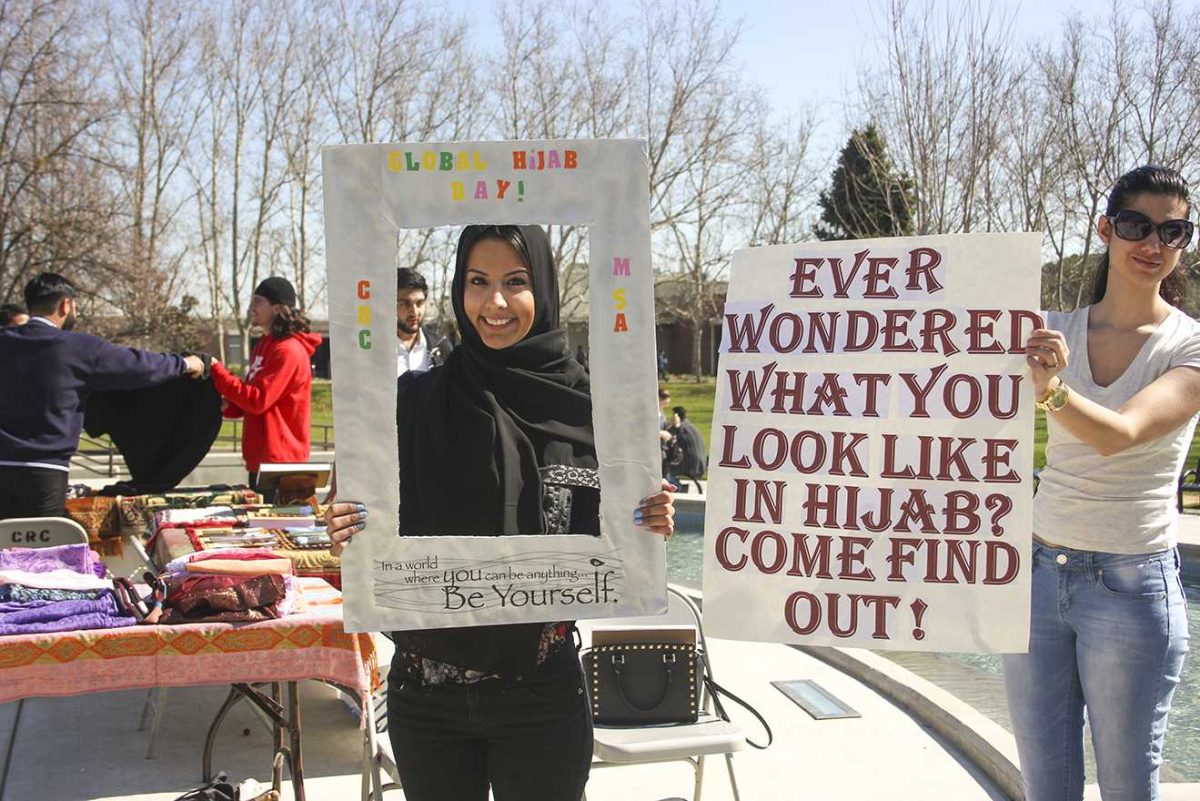Club seeks to break stereotypes by bringing global event to campus
Jamie Meastas, 22, an undeclared major (left) and 20-year-old cinematography major Yalda Biglari (right) took part in the Muslim Student Association event which included interactive props like the picture frame held by Jamie that allowed students to take a picture of themselves trying on a hijab on Feb. 25.
Cosumnes River College students were presented with a unique opportunity when members of the campus group Muslim Student Association took to the quad in order to hold the campus’ very first Global Hijab Day on Feb. 25.
Students of all religious and cultural backgrounds were able to try on hijabs, a head covering worn by some Muslim women, as well as keffiyehs, a traditional Palestinian head scarf worn by some men. Pamphlets with information on the practices of Islam were also available at the event while members of the MSA spoke about the hijab and its true meaning.
“We want to bring awareness to what the hijab is, why muslims wear a hijab, the meaning behind it and kinda giving a voice to Muslim women that wear it,” said MSA President Amerah Edais.
Edais, as well as other MSA members, said many misconceptions about the hijab are that women who wear them are uneducated, oppressed, possessions, living in the middle ages, merely housewives or forced by their parents or husbands to wear them.
Members of MSA all said that Muslim women wear hijabs by choice contrary to those common misconceptions.
“[Global Hijab Day] gets to show people that the hijab is a beautiful thing,” said MSA Treasurer Malaak Allathkani. “It’s not something that represents oppression.”
Muslim women wear hijabs once they hit puberty and in places of worship it is required, said 21-year-old mechanical engineer major Sammy Edan, who is a member of the MSA.
“I have five sisters and then my mom who all cover up, by choice of course. To them and to me it’s both a form of modesty and a form of protection,” Edan said. “[A girl who wears a hijab] holds herself to a higher standard, so you’re not inclined to stare at her or give her any glares.”
Edan said that by women trying on hijabs on campus and seeing themselves in them, many of the misconceptions that they previously had “fade away” and they can see that it is not about feeling or being oppressed whatsoever.
“If you actually want to know how a woman feels when she wears it, you could ask,” Edan said. “So this is kind of one of those days where you would actually go and ask how a sister feels, if she feels oppressed. I can actually say safely that every one one of these women or sisters here wear it by choice.”
The club’s goal in holding the Global Hijab Day was to break many stereotypes regarding hijabs and about the muslim community as a whole. The MSA and the campus were not alone in holding events to bring awareness about the hijab.
Muslims and non-muslims alike came together to celebrate the third annual World Hijab Day on Feb. 1, according to CNN.
MSA members said that the hijab is much more than religious wardrobe, it’s a religious symbol as well.
“Me wearing the hijab says ‘Yes, I’m Muslim and I’m proud,’” Allathkani said.

